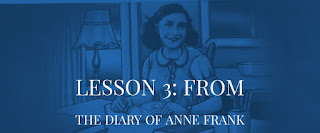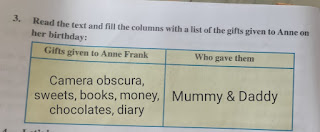Lesson 3 | From the Diary of Anne Frank Questions Answers | Class 7
Lesson 3 | From the diary of Anne Frank questions answers | Class 7
 |
| From The Diary Of Anne Frank |
Sunbeam English Reader Class 7 Chapter 3 Anne Frank all questions answers
1.Let’s see how much we have understood:
(a) Where was Anne Frank from?
Answer: Anne Frank was from Netherlands.
(b) How has the voice of Anne Frank reached out across continents and generations?
Answer: Anne’s voice has reached out across continents and generations with the help of her Diary “The Dairy of Anne Frank”.
(c) What did Anne Frank see lying on the table among her other birthday presents?
Answer: Anne frank saw a diary lying on the table among her other birthday presents.
(d) Why did Anne Frank remain in her bed lying till a quarter to seven on her birthday?
Answer: Anne Frank was lying in her bed till a quarter to seven because at that hour she was not allowed to get up.
(e) Who does 'you' in the lesson refer to?
Answer: In this lesson “From the diary of Anne Frank” the term "you" refers to the 'Diary' named Kitty.
(g) Who welcomed Anne in the dining room?
Answer: Anne Frank was welcomed by her Cat (Moortie) in the dining room.
(h) Why does Anne Frank think that it is an odd idea for someone like her to keep a diary?
Answer: For Anne Frank it was an bad idea for someone like her to keep a diary it is because she thinks that no one will be interested in the unbosoming of a thirteen year old school girl diary.
(i) How does Anne Frank describe her feelings in one of her slightly melancholy days?
Answer: She describe her feelings saying “Paper is more patient than Man”
(j) Who is the kitty ?
Answer: In this Book “From the diary of Anne Frank” Kitty was the name of her “Diary”. She addressed her diary as “Kitty”.
Sunbeam English Reader Class 7 Chapter 3
2. Read the text and write the dates related to Anne Frank's life.
Anne Frank Date of Birth: June 12, 1929
Anne Frank’s Year of Death: March, 1945
Anne Frank Date of starting her diary: June 14, 1942
3. Read the text and fill the columns with a list of the gifts given to Anne on her birthday :
4. Let's learn some grammar :
(a) Read the following sentences carefully and note the use of the words printed in bold italics.
(i) Anne Frank started writing her diary in the summer of 1942. Today, Anne's voice has reached out across continents and generations and her diary is one of the most important documents of the war.
(ii) Rian started writing books at the age of fifteen. Now, he has become a well-known writer.
(iii) Rashmi had started learning the guitar when she was in school. Now, she has opened a music school of her own where she teaches the guitar.
(iv) Sagar finished his homework immediately after he had returned from school. Now, he has gone out to play.
Note the following
The past perfect form is used to show that an action happened before another in the past.
For example, The plane had landed before we reached the airport.
in this sentence, had landed is an example of the past perfect form.
The action of the plane landing happened before the other action took place.
The other action, in this case, is "before we reached the airport. "
(b) Fill in the blank spaces in the following paragraph about Reema with the verbs given in brackets :
Fill the following in your textbook
(A) Receive - Received.
(B) Send - Sent.
(C) Bake - Baked.
(D) Spend - Spent.
Let us revise the different forms of the verb 'have'.
Have
Present forms: have, has.
Past form: had
Note how these verbs are used as helping verbs (also called auxiliary verbs) in sentences :
(i) Have: I have received three gifts.
(ii) Has: Reema has left just now.
Both these sentences have the auxiliary verb 'have' in the present tense.
Now read the following sentences where the verb 'has' is used as a helping verb in the past tense :
(iii) Had: Her grandmother had sent her a letter which she received this morning.
(iv) Had: We had given her a bouquet of flowers which made her happy.
Now fill in the blanks in the following paragraph with the appropriate forms of the verbs given in brackets:
“Today……(be) a special day,”Reema thought. “Grandma…..(have send) such a beautiful letter! I wish she……. (has come) here herself, but she……(have fall) ill, and can’t come!”
5. Read the following sentence :
The teacher handed out the worksheets to the students.
Note that the verb handed is the main verb used in the past tense. Main Verbs can be of two types :
(a) Regular Verbs: These are verbs that form their past tense and past participle forms according to an established pattern. Most verbs have a past tense and past participle with -d.
e.g. play-played-played, walk-walked-walked
(b) Irregular verbs: They are verbs that do not follow the established pattern when they take their past tense and past participle forms.
e.g. drink-drank-drunk, ring-rang-rung
some irregular verbs do not change their forms.
e.g. cut-cut-cut , hit-hit-hit
There are some verbs which take forms like the following in the past tense and past participle-
The verb go takes the forms -
go - went - gone
Now complete the sentences by filling in the blanks with the simple past form of the verbs given below.
Read the following sentences about Anne Frank:
(a) A thirteen year old girl in the Netherlands was given a diary on her birthday.
(b) The world would not have known her, had her father not published the diary after her death.
(c) My family does not allow me to get up at that hour.
As you can see, we focus on the doer of the action in an active sentence.
Here are a few more examples:
(i) I write poetry(active). - poetry is written by me(passive)
(ii) I am writing poetry – Poetry is being written by me
(iii) I have written poetry – Poetry has been written by me
(iv) I wrote poetry – Poetry was written by me.
(v) I had written poetry – Poetry had been written by me.
All the sentences in Column B are passive, but they use different verbs to show the differences in the time when the action happened. Here are a few sentences about Anne Frank. Rewrite the sentences in the passive form.
(i) Anne Frank receives a diary for her birthday.
Answer: A Diary has been received by Anne Frank on her birthday.
(ii) Anne is counting her gifts.
Answer: Gifts are being counted by Anne.
(iii) Anne has baked biscuits for herself.
Answer: Biscuits had been baked by Anne for herself.
(iv) Anne wrote a diary entry.
Answer: A diary entry was written by Anne.
(v) Her parents had given her a blue blouse.
Answer: A blue blouse had been given to her by her parents.
7. Reading Storybooks:
In the text you read about the books that were gifted to Anne on her birthday. Prepare a list of English storybooks (or books translated to English ) that you have read.
work with a partner. You and your partner will then tell each other which book on the list is your favorite, who are your favorite characters in the book and why you like the book.
Help one another to write a brief book review of a book you have read recently. Write in the following format :
(i) The Name of the book: “The Diary of a young girl”
(ii) Name of the author: Anne Frank
(iii) What type of a book it is (adventure, historical, biography, fiction and so on): Historical
(iv) Narration - is the book narrated in the first person, second person or third person: First Person.
(vi) Plot - A brief summary of the book (what was the book is about without giving too many details – Her diary is one of the most important documents of the war. It was during the Second World war she started writing her diary.
(vii) Whether you liked/disliked the book. (Give reasons): Yes I liked it very much.
(viii) Whether you would like to read more books by the author: Yes
(ix) Would you encourage others to read this book? how would you rate the book? (How many stars would you give?) Yes. I will rate 5/5 stars.
8.(a) In the lesson, you have read a diary entry by Anne Frank who was delighted to be gifted her diary on her birthday. Diary writing is one of the most personal and informal categories of writing. It can be based on a personal experience, a scene, a description or narration of certain events or any other thing.
A good diary entry usually contains the following features:
(i) The day, date, place and time of writings the entry.
For example:
Friday,July 7, 2019 (4 p.m.)
(ii) A formal heading is optional. If you want, you can give one.
(iii) You can give your diary a name; and address the diary by that name.
For example: Dear Kirti (if you have named your diary Kirty)
(iv) The style of writing is informal (as if addressing a trusted friend)
(v) Since the diary is a personal document, the entry does not need any signature. Like the formal heading, the signature is optional.
Now prepare a diary entry which documents your birthday.
Apart from the above guidelines, your diary entry may include the following.
(a) How your day began.
(b) How you celebrated the day
(c) Who you had invited.
(d) What gifts you received.
(e) How you felt.
(a) Where was Anne Frank from?
Answer: Anne Frank was from Netherlands.
(b) How has the voice of Anne Frank reached out across continents and generations?
Answer: Anne’s voice has reached out across continents and generations with the help of her Diary “The Dairy of Anne Frank”.
(c) What did Anne Frank see lying on the table among her other birthday presents?
Answer: Anne frank saw a diary lying on the table among her other birthday presents.
(d) Why did Anne Frank remain in her bed lying till a quarter to seven on her birthday?
Answer: Anne Frank was lying in her bed till a quarter to seven because at that hour she was not allowed to get up.
(e) Who does 'you' in the lesson refer to?
Answer: In this lesson “From the diary of Anne Frank” the term "you" refers to the 'Diary' named Kitty.
(f) What is "Camera Obscura"?
Answer: The term “Camera Obscura” means a simple box with a small hole in one side. It is used to produce images.(g) Who welcomed Anne in the dining room?
Answer: Anne Frank was welcomed by her Cat (Moortie) in the dining room.
(h) Why does Anne Frank think that it is an odd idea for someone like her to keep a diary?
Answer: For Anne Frank it was an bad idea for someone like her to keep a diary it is because she thinks that no one will be interested in the unbosoming of a thirteen year old school girl diary.
(i) How does Anne Frank describe her feelings in one of her slightly melancholy days?
Answer: She describe her feelings saying “Paper is more patient than Man”
(j) Who is the kitty ?
Answer: In this Book “From the diary of Anne Frank” Kitty was the name of her “Diary”. She addressed her diary as “Kitty”.
Sunbeam English Reader Class 7 Chapter 3
2. Read the text and write the dates related to Anne Frank's life.
Anne Frank Date of Birth: June 12, 1929
Anne Frank’s Year of Death: March, 1945
Anne Frank Date of starting her diary: June 14, 1942
3. Read the text and fill the columns with a list of the gifts given to Anne on her birthday :
 |
| Anne Frank questions answers |
4. Let's learn some grammar :
(a) Read the following sentences carefully and note the use of the words printed in bold italics.
(i) Anne Frank started writing her diary in the summer of 1942. Today, Anne's voice has reached out across continents and generations and her diary is one of the most important documents of the war.
(ii) Rian started writing books at the age of fifteen. Now, he has become a well-known writer.
(iii) Rashmi had started learning the guitar when she was in school. Now, she has opened a music school of her own where she teaches the guitar.
(iv) Sagar finished his homework immediately after he had returned from school. Now, he has gone out to play.
Note the following
The past perfect form is used to show that an action happened before another in the past.
For example, The plane had landed before we reached the airport.
in this sentence, had landed is an example of the past perfect form.
The action of the plane landing happened before the other action took place.
The other action, in this case, is "before we reached the airport. "
(b) Fill in the blank spaces in the following paragraph about Reema with the verbs given in brackets :
Fill the following in your textbook
(A) Receive - Received.
(B) Send - Sent.
(C) Bake - Baked.
(D) Spend - Spent.
Let us revise the different forms of the verb 'have'.
Have
Present forms: have, has.
Past form: had
Note how these verbs are used as helping verbs (also called auxiliary verbs) in sentences :
(i) Have: I have received three gifts.
(ii) Has: Reema has left just now.
Both these sentences have the auxiliary verb 'have' in the present tense.
Now read the following sentences where the verb 'has' is used as a helping verb in the past tense :
(iii) Had: Her grandmother had sent her a letter which she received this morning.
(iv) Had: We had given her a bouquet of flowers which made her happy.
Now fill in the blanks in the following paragraph with the appropriate forms of the verbs given in brackets:
“Today……(be) a special day,”Reema thought. “Grandma…..(have send) such a beautiful letter! I wish she……. (has come) here herself, but she……(have fall) ill, and can’t come!”
5. Read the following sentence :
The teacher handed out the worksheets to the students.
Note that the verb handed is the main verb used in the past tense. Main Verbs can be of two types :
(a) Regular Verbs: These are verbs that form their past tense and past participle forms according to an established pattern. Most verbs have a past tense and past participle with -d.
e.g. play-played-played, walk-walked-walked
(b) Irregular verbs: They are verbs that do not follow the established pattern when they take their past tense and past participle forms.
e.g. drink-drank-drunk, ring-rang-rung
some irregular verbs do not change their forms.
e.g. cut-cut-cut , hit-hit-hit
There are some verbs which take forms like the following in the past tense and past participle-
The verb go takes the forms -
go - went - gone
Now complete the sentences by filling in the blanks with the simple past form of the verbs given below.
 |
| Lesson 3: Anne Frank |
Read the following sentences about Anne Frank:
(a) A thirteen year old girl in the Netherlands was given a diary on her birthday.
(b) The world would not have known her, had her father not published the diary after her death.
(c) My family does not allow me to get up at that hour.
As you can see, we focus on the doer of the action in an active sentence.
Here are a few more examples:
(i) I write poetry(active). - poetry is written by me(passive)
(ii) I am writing poetry – Poetry is being written by me
(iii) I have written poetry – Poetry has been written by me
(iv) I wrote poetry – Poetry was written by me.
(v) I had written poetry – Poetry had been written by me.
All the sentences in Column B are passive, but they use different verbs to show the differences in the time when the action happened. Here are a few sentences about Anne Frank. Rewrite the sentences in the passive form.
(i) Anne Frank receives a diary for her birthday.
Answer: A Diary has been received by Anne Frank on her birthday.
(ii) Anne is counting her gifts.
Answer: Gifts are being counted by Anne.
(iii) Anne has baked biscuits for herself.
Answer: Biscuits had been baked by Anne for herself.
(iv) Anne wrote a diary entry.
Answer: A diary entry was written by Anne.
(v) Her parents had given her a blue blouse.
Answer: A blue blouse had been given to her by her parents.
7. Reading Storybooks:
In the text you read about the books that were gifted to Anne on her birthday. Prepare a list of English storybooks (or books translated to English ) that you have read.
work with a partner. You and your partner will then tell each other which book on the list is your favorite, who are your favorite characters in the book and why you like the book.
Help one another to write a brief book review of a book you have read recently. Write in the following format :
(i) The Name of the book: “The Diary of a young girl”
(ii) Name of the author: Anne Frank
(iii) What type of a book it is (adventure, historical, biography, fiction and so on): Historical
(iv) Narration - is the book narrated in the first person, second person or third person: First Person.
(vi) Plot - A brief summary of the book (what was the book is about without giving too many details – Her diary is one of the most important documents of the war. It was during the Second World war she started writing her diary.
(vii) Whether you liked/disliked the book. (Give reasons): Yes I liked it very much.
(viii) Whether you would like to read more books by the author: Yes
(ix) Would you encourage others to read this book? how would you rate the book? (How many stars would you give?) Yes. I will rate 5/5 stars.
8.(a) In the lesson, you have read a diary entry by Anne Frank who was delighted to be gifted her diary on her birthday. Diary writing is one of the most personal and informal categories of writing. It can be based on a personal experience, a scene, a description or narration of certain events or any other thing.
A good diary entry usually contains the following features:
(i) The day, date, place and time of writings the entry.
For example:
Friday,July 7, 2019 (4 p.m.)
(ii) A formal heading is optional. If you want, you can give one.
(iii) You can give your diary a name; and address the diary by that name.
For example: Dear Kirti (if you have named your diary Kirty)
(iv) The style of writing is informal (as if addressing a trusted friend)
(v) Since the diary is a personal document, the entry does not need any signature. Like the formal heading, the signature is optional.
Now prepare a diary entry which documents your birthday.
Apart from the above guidelines, your diary entry may include the following.
(a) How your day began.
(b) How you celebrated the day
(c) Who you had invited.
(d) What gifts you received.
(e) How you felt.

.png)




No comments:
Post a Comment